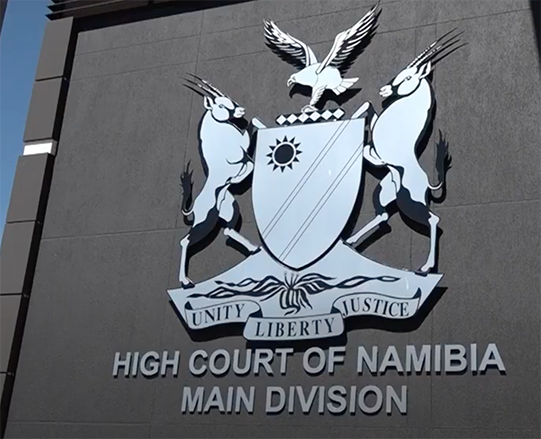| CASE NAME | Dausab v The Minister of Justice [2024] NAHCMD 331 |
| COUNTRY | Namibia |
| COURT/ TRIBUNAL | The High Court of Namibia, Main Division, Windhoek |
| STATUS | Judgment delivered on 21 June 2024 |
SUMMARY
Friedel Dausab, a gay Namibian man, successfully challenged the compatibility of the common law offence of sodomy and related offences with his rights under the Constitution of Namibia. On 21 June 2024, a three-judge bench of the High Court of Namibia ruled that the laws amounted to unfair discrimination and were therefore unconstitutional and invalid. The court held that “the enforcement of the private moral views of a section of the community (even if they form the majority of that community), which are based to a large extent on nothing more than prejudice” is not justifiable, and that criminalising gay men “poses a greater threat to the fabric of society as a whole than tolerance”. In July, the government of Namibia filed an appeal against the High Court judgment.
CASE DETAILS
Same-sex intimacy between men was initially criminalised in Namibia under colonial rule. The common law offences of “sodomy” and “unnatural sexual offences” derived originally from the imposition of Roman Dutch law on South Africa, and were inherited from South African law into Namibian law when Namibia became an independent nation in 1990. They were subsequently found to be contrary to the South African Constitution and have not been part of South African law since the ground-breaking judgment in National Coalition for Gay and Lesbian Equality and Another v Minister of Justice and Others in 1998. In Namibia however, the offences made their way into the statutory law via a number of different legislative references. Although only men were criminalised, the whole LGBT community were affected by the stigma and discrimination these laws enable.
In June 2022, Friedel Dausab filed a case before the High Court of Namibia challenging the constitutionality of the common law offences and the statutory provisions which incorporated the crimes of sodomy and unnatural sexual offences. The case was heard in October 2023, and judgment was handed down on 21 June 2024. In July, the government of Namibia filed an appeal against the High Court judgment.
THE PARTIES
The Applicant, Friedel Dausab, is a gay Namibian who has experienced the impact of these laws in both his personal and professional life. He is an expert in HIV prevention and treatment and has many years of experience as an LGBT rights activist. He brought the case in his personal capacity.
The Respondents are the Minister of Justice, the Minister of Home Affairs, Safety and Security, the Minister of Defence, the Prosecutor General and the Attorney General. Some of the Respondents are cited because they are directly involved with the content and enforcement of the criminal law. Others are cited because they are responsible for specific pieces of legislation in which the offences are mentioned.
APPLICABLE LAW
The Applicant challenged the validity of the common law offences of sodomy and unnatural sexual offences, as well as all statutory enactments of these offences, on six constitutional grounds:
| RIGHTS | PROVISIONS |
| Right to equality and freedom from discrimination | Article 10 |
| Right to dignity | Article 8 |
| Right to privacy | Article 13(1) |
| Right to freedom of association | Article 21(e) |
| Right to freedom of expression | Article 21(a) |
The sixth ground was that the challenged offences were vague and therefore violated the constitutional principle of legality and the rule of law.
RELIEF SOUGHT
The Applicant sought an order from the High Court declaring that the common law offences of sodomy and unnatural sexual offences, as well as the statutory provisions that incorporates these offences, are unconstitutional and invalid.
DECISION
The three-judge bench of the High Court of Namibia declared that the common law offences of sodomy and unnatural sexual offences are unconstitutional and invalid, as these laws amount to unfair discrimination under Article 10 of the Constitution.
The Court found that the conduct that is criminalised between two men under the challenged offences, whether committed with consent and in private, is not regarded as criminal if committed by a male with a female, or between women. The only distinction therefore is the participants’ gender or sex (paragraph 19). The court held that this distinction is unjustifiable, noting that it is not reasonably justifiable to make an activity criminal “just because a segment, maybe even a majority of the citizenry consider it to be unacceptable” (paragraph 30).
The Court further held that whilst the difference in treatment between gay men and heterosexual men was not based on one of the enumerated grounds set out in Article 10 (sex, race, colour, ethnic origin, religion, creed or social or economic status), the differentiation still amounts to discrimination which is unconstitutional. The Court emphasised the special place that equality has in the Namibian Constitution (paragraph 47) and highlighted that discrimination in the context of the Constitution means an element of unjust or unfair treatment (paragraph 56).
Appeal
In July, the government of Namibia filed an appeal against the High Court judgment in the Supreme Court of Namibia.
THE HUMAN DIGNITY TRUST’S ROLE
The Applicant was represented by Gilbert Marcus SC, Natasha Bassingthwaighte, Ramon Maasdorp, Michaela Kritzinger and AngulaCo Inc. The legal team was supported by the Human Dignity Trust with assistance from Decherts LLP.

